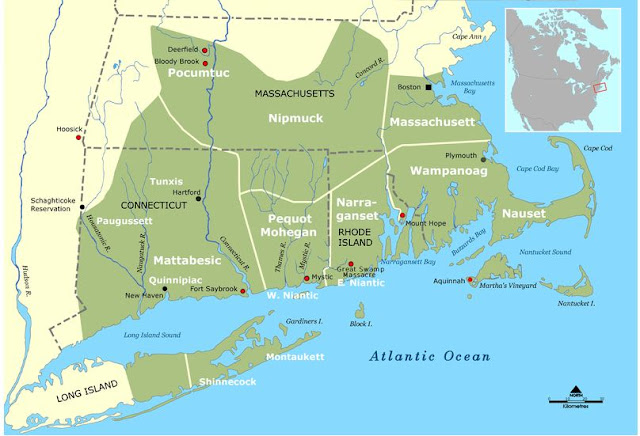Trump
Official discusses Trump position (or lack of one) on tribal land acquisitions
Joshua Peterson, Faegre Baker
Daniels
 |
| Pre-colonial tribal boundaries in southern New England |
The
Subcommittee on Indian, Insular and Alaska Native Affairs held a July 13
hearing to compare 21st century trust land acquisition practices with the
intent of the 73rd Congress in Section 5 of the Indian Reorganization Act
(IRA), which is now codified at 25 U.S.C. § 5108.
The hearing
encompassed a number of topics regarding land-into-trust decisions, including
on-reservation and off-reservation tribal land acquisition, state and local
government’s role in such decisions, and the Department of Interior’s (DOI)
current — but potentially evolving — interpretation of “under federal jurisdiction”
as written in the IRA.
The
Subcommittee invited four people to testify at the hearing, including Acting
Deputy Secretary of the Interior Jim Cason.
Cason’s role as
associate deputy secretary of the DOI during the Bush administration became a topic
of interest in the hearing, as Rep. Norma Torres, D-CA, said that tribes felt
there was a de facto moratorium on all land-into-trust acquisitions in Cason’s
previous tenure with the DOI.
In an April 6,
2017 memorandum, the DOI announced that “delegated authority for
off-reservation land-into-trust decisions for gaming will lie with the Acting
Deputy Secretary for the Department of Interior”—once again giving Cason the
power to potentially blockade tribal land acquisitions.
When the Subcommittee expressed tribal concern about delegating Cason so much power given his track record, Cason said that his prior policy was merely a response to Cobell v. Salazar, a massive lawsuit against the United States concerning mismanagement of tribal trust assets.
He said it
“didn’t make a whole lot of sense to say, ‘yes, I want to take more land,’ when
all of you are suing me for how I didn’t take care of the land I have.”
Cason assured
the Subcomittee that, because Cobell has been settled and is
no longer a major issue, the DOI “will take a look at land-into-trust
applications.”
Cason showed
some support for on-reservation tribal land acquisition, but limited support
for off-reservation tribal land acquisition.
He told the
Subcommittee that while on-reservation trust acquisitions are important for
tribes, “taking off-reservation lands into trust may pose complications
for [the DOI]” and for state and local governments.
He “encouraged”
the Subcommittee to examine how the DOI implements its off-reservation land
acquisition regulations and let the DOI know the Subcommittee’s thoughts.
After Cason
mentioned state and local governments, Rep. Raúl Grijalva, D-AZ, asked Cason if
he thinks state and local governments should have veto power over tribal
land-into-trust applications — to which Cason responded in the affirmative.
Under current
regulations, state and local governments may only submit comments for the DOI
to consider when determining whether to approve a land-into-trust application.
A veto power
would substantially increase the amount of leverage, power, and control state
and local governments have over the land-into-trust process — a process and
relationship that many of the pro-tribal voices at the hearing insisted should
involve only the tribes and the federal government.
The
Subcommittee also sought Cason’s view on M-37029 — the Solicitor opinion
authored by former DOI Solicitor Hilary Tompkins that interpreted the phrase
“under federal jurisdiction” as used in Section 5 of the IRA.
The opinion
currently governs the DOI's analysis of whether a tribe was under federal
jurisdiction in 1934.
Courts have
accepted the opinion’s analysis and given the DOI's analysis, which it
used to decide whether the Cowlitz Indian Tribe could have land taken into
trust for its benefit under Section 5 of the IRA, Chevron deference.
Cason said the
DOI has concerns about the opinion, because its criteria are “loose” and
“wide,” and the opinion “doesn’t respond very particularly to the [Carcieri]
decision.”
Although he
said that the opinion will remain the official position of the DOI for
now, he said the DOI is “taking a look at firming [the opinion] up a
little bit differently to be more clear.”
The
Subcommittee also discussed a “clean” Carcieri fix throughout
the hearing, which would change “any recognized Indian tribe now under federal
jurisdiction” in Section 5 of the IRA to “any federally recognized Indian
tribe.”
This fix would
remove the need to determine whether a tribe was under federal jurisdiction in
1934 and open up the benefits of Section 5 to all federally recognized tribes.
Rep. Tom Cole,
R-OK, has proposed a bill, H.R. 130, to implement such a fix.
Cason refused
to take a stance on whether Congress should pass the bill even when asked
directly.
He admitted
only that a clean fix would make his job easier and told the Subcommittee that
he does not “have a specific ask for Congress” right now.
© Faegre Baker Daniels 2017 | Attorney Advertising